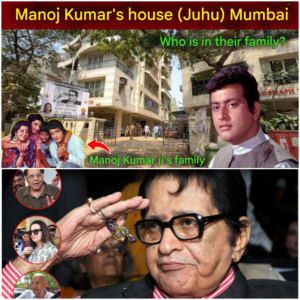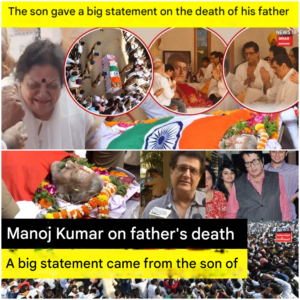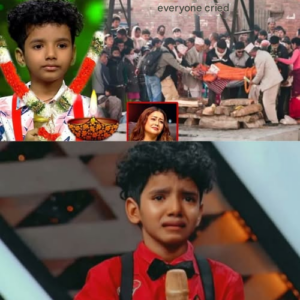How much property did Manoj Kumar leave behind? Who will be the owner? Manoj Kumar Net Worth
.
.
.
play video:
Bharat Kumar’s Final Bow: The Life, Death, and Legacy of Manoj Kumar—What He Left Behind
The Indian film industry, and indeed the heart of the nation, was shaken on April 4, 2025, when the news broke: Manoj Kumar, known lovingly and reverently as “Bharat Kumar,” had passed away. At the age of 87, he left behind not only a powerful legacy of cinematic excellence and patriotic storytelling, but also considerable wealth amassed over decades of work in Bollywood.
As fans lit candles and shared scenes from his iconic films, many also wondered: What exactly did Manoj Kumar leave behind? What was his net worth, and who would inherit the legacy of the man who made patriotism a cinematic movement?
Let us walk you through the powerful journey of Manoj Kumar, the wealth he accumulated, and what happens next after the curtain has fallen on one of Indian cinema’s most iconic figures.
A Journey from Partition to Patriotic Stardom
Manoj Kumar was born as Harikishan Giri Goswami on July 24, 1937, in Abbottabad—then part of British India, now in Pakistan. Following the traumatic Partition of India in 1947, his family migrated to Delhi with nothing but hope in their hearts and resilience in their blood. The pain of displacement deeply imprinted itself on young Harikishan, a sentiment that would later become the emotional core of his most iconic works.
While studying at Delhi University, he juggled small jobs to make ends meet. His dream? To become an actor. Inspired by legends like Raj Kapoor, Ashok Kumar, and Dilip Kumar, he would often rehearse their dialogues in front of mirrors—planting the seeds of an extraordinary destiny.
The Rise of Bharat Kumar
Manoj Kumar began his film career in 1957 with a minor role in the film Fashion. However, it was the 1965 release Shaheed, where he portrayed freedom fighter Bhagat Singh, that catapulted him into national consciousness. Audiences connected instantly with his depth, intensity, and nationalistic fervor.
Then came Upkar (1967)—a film inspired by Prime Minister Lal Bahadur Shastri’s slogan “Jai Jawan Jai Kisan.” Written, directed, and acted in by Manoj Kumar, the film was more than a hit—it was a cultural revolution. With it, he became not just a star, but a symbol. Soon after, movies like Purab Aur Paschim (1970), Roti Kapda Aur Makaan (1974), and Kranti (1981) cemented his reputation as the cinematic embodiment of patriotism.
He wasn’t just acting—he was giving a voice to the nation’s conscience.
The Final Years: Illness, Silence, and Dignity
In the last decade of his life, Manoj Kumar stepped away from the limelight. As the industry shifted focus to commercial blockbusters and box office numbers, Kumar’s socially rooted, message-driven cinema found fewer takers.
However, he never expressed bitterness. Despite suffering from various age-related ailments, including memory loss and liver cirrhosis in his final years, he remained composed and humble. In February 2025, he was admitted to Mumbai’s Kokilaben Ambani Hospital with complications stemming from a myocardial infarction and decompensated liver cirrhosis.
His family—especially his wife Shashi Goswami and son Kunal Goswami—remained by his side till his last breath at 3:30 AM on April 4. He passed away surrounded by loved ones, with the hymn “O Mere Desh Ki Dharti” echoing in the hearts of countless admirers across the nation.
Manoj Kumar’s Net Worth and Property Portfolio
Manoj Kumar’s life was defined by simplicity, but his success in the film industry translated into significant wealth. According to media and financial reports, at the time of his passing, Manoj Kumar’s estimated net worth was around ₹250 crore (approximately $30 million USD).
Here’s a closer look at what comprised his estate:
Real Estate Holdings: Multiple properties in Mumbai, including a sea-facing bungalow in Juhu and a multi-storey apartment in Bandra. These are considered to be in premium locations and are valued at over ₹120 crore collectively.
Investments: Manoj Kumar was known to be a conservative but wise investor. His financial advisors reportedly managed a balanced portfolio of stocks, mutual funds, and long-term government bonds, estimated at around ₹60–70 crore.
Film Royalties: His evergreen films like Upkar, Roti Kapda Aur Makaan, and Kranti continue to generate substantial royalties through re-runs, streaming rights, and music licenses.
Charity and Trusts: Kumar had quietly set up a trust to support the education of underprivileged children and war widows. A portion of his estate is reportedly bequeathed to this charitable organization, reflecting his lifelong commitment to social causes.
Who Will Inherit His Wealth?
According to sources close to the family, Manoj Kumar left behind a will outlining the distribution of his estate. While exact details remain private, it’s believed that:
His wife Shashi Goswami will receive the primary share of his real estate and financial investments.
His son Kunal Goswami, a former actor, will inherit the rights and royalties of Kumar’s film portfolio and be responsible for managing the Bharat Kumar Trust.
A portion of the wealth is expected to be directed toward philanthropic causes as per his wishes.
Family sources have also revealed that Kumar made it clear he wanted his wealth to “serve a purpose” even after he was gone—an echo of the message he delivered through his cinema for decades.
A Life Beyond Awards
Over his career, Manoj Kumar won numerous accolades. Among them:
Padma Shri (1992)
Dadasaheb Phalke Award (2015)
7 Filmfare Awards, including for Best Director and Best Story
Despite these honors, he gradually drifted from the public eye. Notably, the industry that once celebrated him seemed to forget him in his twilight years. He stopped receiving invitations to award shows. Younger directors rarely reached out. But he never complained.
“He wasn’t chasing followers or fame,” his son Kunal once said. “He wanted to leave behind impact, not noise.”
The Final Goodbye
His funeral was held with full state honors, attended by a handful of industry veterans, political leaders, and fans who had grown up on his films. The crowd may not have been as large as his legacy, but their emotions echoed loud.
Prime Minister Narendra Modi tweeted: “Manoj Kumar ji gave India its cinematic soul. Through his films, he told us what it meant to be Indian. His voice will live on.”
The Man Behind the Patriot
Beyond the patriotism and cinematic fervor, there existed a man who deeply loved his family. His wife Shashi stood by him like a silent pillar, rarely making public appearances but playing a crucial role behind the scenes. Their relationship was built on trust and unwavering companionship.
And though Manoj Kumar never vocalized much about love, his enduring marriage and commitment to his roots stood as proof.
The Legacy Lives On
Manoj Kumar was more than just an actor or director. He was an idea. An embodiment of conscience in a world that’s often distracted by glamour. His films were not just entertainment—they were education, inspiration, and reminders of what it meant to be Indian.
In today’s time, where success is often measured in likes and followers, Manoj Kumar’s life teaches us that depth matters more than dazzle, and legacy matters more than limelight.
Final Words
Manoj Kumar is no more. But every time “Mere Desh Ki Dharti” plays at a school function, every time a young filmmaker dares to make a socially-driven film, and every time someone remembers that cinema can also heal and uplift—his soul lives on.
He didn’t just make movies. He made India believe.
To Manoj Kumar, the man who taught us that patriotism can sing, cry, and inspire—thank you. You may have left the stage, but your voice will echo in our hearts forever.

News
How was Manoj Kumar able to keep this secret hidden for 60 years? Manoj Kumar Secret Love Story
How was Manoj Kumar able to keep this secret hidden for 60 years? Manoj Kumar Secret Love Story . . . play video: How Manoj Kumar Kept His Secret Love Hidden for 60 Years In the golden era of Indian…
Fans were in tears when they found out what happened to Avirbhav? Superstar Singer Season 3 | Superstar Singer Avirbhav
Fans were in tears when they found out what happened to Avirbhav? Superstar Singer Season 3 | Superstar Singer Avirbhav. . . . play video: What Really Happened to Avirbhav? Clearing the Air on the Superstar Singer Season 3 Winner’s…
Visit Manoj Kumar’s House in Mumbai | Manoj Kumar Family | Shocking Facts!
Visit Manoj Kumar’s House in Mumbai | Manoj Kumar Family | Shocking Facts! . . . play video: Inside Manoj Kumar’s Home in Juhu: A Final Glimpse Into the Life of Bharat Kumar After His Passing On April 4, 2025,…
Manoj Kumar News Update: Son gave a big statement on father’s death | Manoj Kumar Son
Manoj Kumar News Update: Son gave a big statement on father’s death | Manoj Kumar Son. . . . play video: Manoj Kumar News Update: Son Kunal Goswami’s Heartfelt Tribute—What Was Said at the Funeral of India’s ‘Bharat Kumar’ The…
Manoj Kumar had become like this in his last days, this dangerous disease took his life! Manoj Kumar Death Reason
Manoj Kumar had become like this in his last days, this dangerous disease took his life! Manoj Kumar Death Reason . . . play video: End of an Era: The Final Days and Legacy of Manoj Kumar, Bollywood’s ‘Bharat Kumar’…
Avirbhav – Superstar Singer 3 winner Avirbhav performs the final song!
Avirbhav – Superstar Singer 3 winner Avirbhav performs the final song! . . . play video: Avirbhav’s Grand Finale Triumph – The Voice That Moved a Nation in Superstar Singer Season 3 The grand finale of Superstar Singer Season 3…
End of content
No more pages to load











